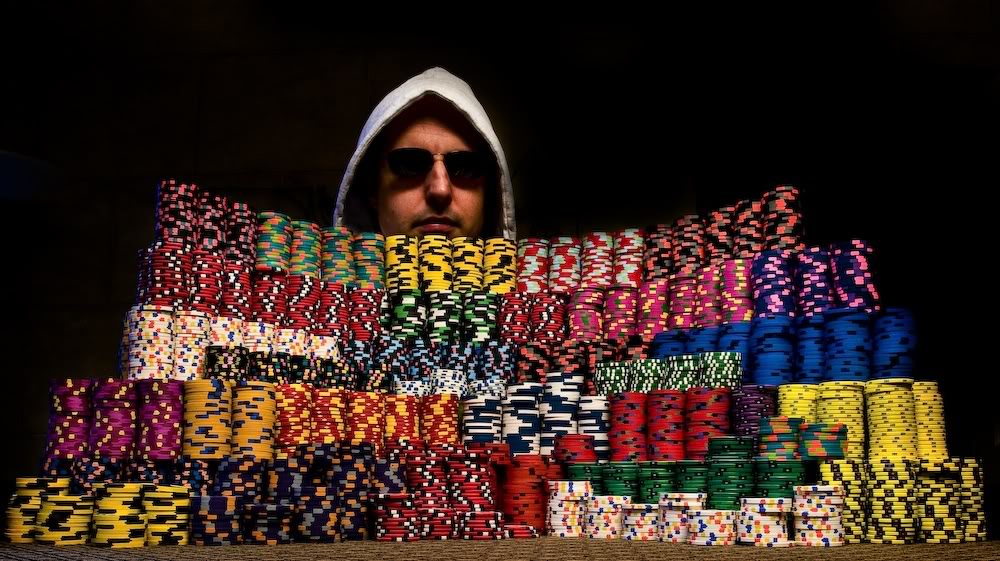
The guy who invented poker was bright, but the guy who invented the chip was a genius".
While this quote can be used to highlight the fact that chips allow us to forget about the value of money they represent, it also features the main tool poker players have at their disposal when trying to best one another - the aforementioned poker chips. In both poker and life the size of your stack matters and the way you use it matters even more so.
Stack Size Matters!
The very first decision you make when sitting down to play cards at a poker table (virtual or otherwise) is the amount of money you'll buy in for. This decision is the very first opportunity to gain an edge over the opposition... or make your first mistake.
Nowadays decision about the buy-in amount will usually be fairly straightforward - when playing at a regular table you should buy-in for the maximum amount of 100bb. In the good old poker days when it was commonly allowed to buy in for as little as 20 big blinds, short stack strategy was a viable option that many players used to their advantage.

Some poker rooms allow you to play at so-called "deepstack tables" where the maximum buy-in is equal to 200bb-250bb and utilizing them can be a great idea. The main problem with it is that - like we've already mentioned - 90% of educational materials out there assume 100bb stacks and therefore deepstack hold'em is kinda like Pot Limit Omaha - exciting and unexplored.
If you feel comfortable playing in the metagame in which average player's knowledge about the optimal strategy is at a relatively low-level mastering deep stack play can end up being very profitable. Otherwise, there's nothing wrong with buying in for 100bb especially if you have a tough player on your left.
Your buy-in amount (along with some other factors like board texture, opponent type etc.) will directly impact the relative strength and possible implied odds of your hands. Trying to set mine with a 35bb stack is much less attractive than with 120bb stack. Similarly, playing hands like A2s or 75s becomes much more attractive around 120-140bb mark.
Reverse implied odds are also important. Players are much less likely to put 200bb stacks into the pot with a holding that's far from the nuts and therefore it's much easier to be on a receiving end of a cooler in a deep stack game if you're not careful.
That's why you should often base your hand selection on recreational players already in the hand or directly behind you. 9d7d is not going to be an all-star hand when playing against a bunch of 40-70bb stacks, but KJo will be an absolute powerhouse.

Pot Management
When it comes to pot management (controlling the size of the pot on future streets with our betsizing based on our goal in the hand) there are two main situations that come up over and over again.
Let's take a closer look at them:
- Managing the pot when value betting against the recreational player. As a general rule the weaker your opponent is the more loose-passive he or she will be and therefore you can't rely on the opponent to build the pot for you. Unless you have a specific reason to go for a cute play like check/raise (which will, of course, happen from time to time) stick to the good old bet, bet, bet line with value. As for the size of those bets, don't be afraid to go for a highly exploitable sizing against someone with static calling ranges. Many recreational players pay far more attention to the absolute value of their hand than anything else and if they decided they will call a bet it doesn't really matter if it's going to be a half-pot of a full-pot one. This doesn't mean you can massively overbet every street for value with impunity - you should manage the pot correctly so you don't have to.
- Managing the pot while bluffing. This is a bit more tricky and heavily opponent dependent. Again vs. a player using static ranges go for the exploitable sizing and keep your bluffs cheap. Against someone who knows how to play cards, keep your sizing consistent and aim to exert as much pressure as possible. I've seen many failed three barrel bluff attempts that looked really great in theory and should show a great expectation in the long run... if not for the fact that hero forgot basic arithmetics and his bet on the turn left him with only around half-pot sized bet on the river which wasn't enough to adequately pressure the villain. Always think about the way your bet will affect the size of the pot on future streets.

Ratholing
Lastly, let's talk about the phenomenon called ratholing or 'going south' which refers to taking some amount of chips away from your stack while still remaining in the game. This kind of behavior is prohibited in most places and if it's not prohibited it's heavily frowned upon since you effectively deny other players the ability to win the maximum amount of money in pots against you.
Putting the moral quandary aside for a second, there's one instance in which ratholing is actually a good idea. If you're a zoom/rush/speed poker player and you don't feel particularly great about your deep stack poker skills, you should include mandatory table resets into your routine so that you always play with the amount that you feel most comfortable with (and a replenished timebank which is a nice added bonus).
More Top Rated Content
Articles
- Limitations of a HUD
- Zoom Poker Strategy Guide
- Protect Against Malware and Hackers - Keep Your Poker Account Safe
Coaching Videos


